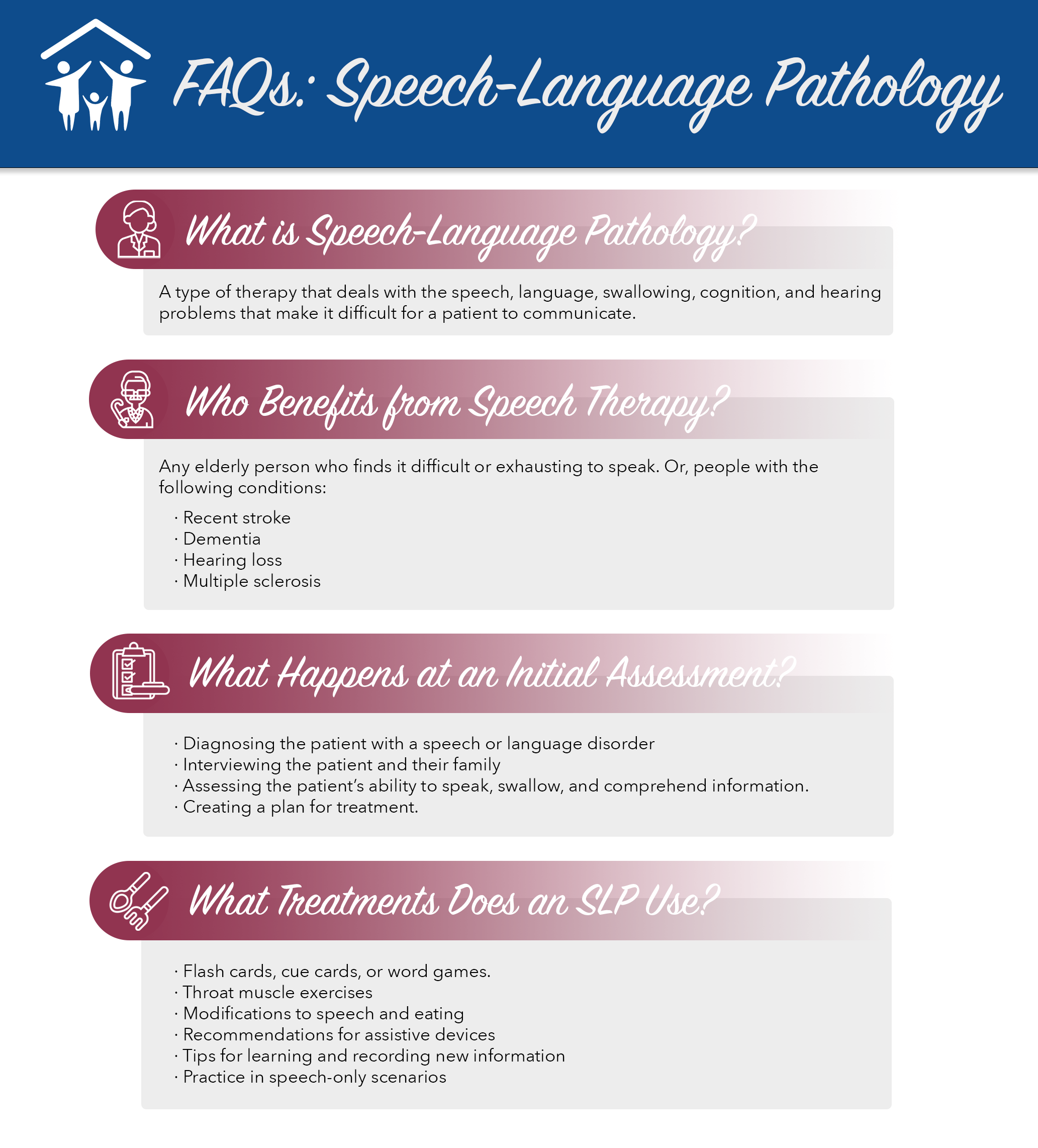How Can a Speech-Language Pathologist Help You?
Family Care articles are not a substitute for medical or legal advice from a licensed professional.
What Is Speech-Language Pathology?
Speech-language pathology, also referred to as speech therapy, has the main purpose of improving patients’ communication. It deals with improving the two parts of its name: speech and language. However, a speech-language pathologist who works with seniors can also address issues with swallowing and eating, impaired cognition, and difficulty hearing.
Who Benefits from Speech Therapy?
As we age, many of our muscles deteriorate. The vocal cords are no different! As they weaken, they stop opening and closing properly. It can take more effort to speak. Because of this, any senior can benefit from speech therapy, even if they haven’t had a specific health incident related to their speech. Feeling hoarse or worn out by speaking is part of aging, and a speech therapist can help make speaking less tiring.
More specifically, speech therapists often work with adult patients who:
Have had a recent stroke. A stroke can impact the part of the brain that tells you to speak. This can include things like difficulty understanding words, difficulty moving your jaw, or difficulties with your memory and attention span. A stroke can also impact your ability to swallow, making it difficult or dangerous to eat and drink.
Have new or worsening dementia. Dementia impacts your brain’s ability to learn and retain new information. Especially in its later stages, dementia can impact a person’s ability to eat and drink independently.
Have hearing loss. About 1/3 of adults between 61 to 70 years of age are affected by hearing loss. This makes it more difficult to communicate with those around us, and can contribute to dementia.
Have multiple sclerosis. MS impacts a person’s ability to control their muscles, which includes the vocal cords and facial muscles. Slurred words, impaired volume control, hoarseness, and changes in vocal tone are just some of the common indications that MS is impacting a person’s speech. MS can also cause problems with swallowing, and lead to the feeling of food being stuck in the throat.
If you believe you or a loved one could benefit from speech therapy, you can bring that concern to the patient’s home healthcare agency or primary care physician. They can help you make the right connections to get started.
What Does a Speech Therapy Evaluation Look Like?
At an initial assessment, an SLP will determine if you have a speech and language disorder. The assessment will include a direct interview with the patient, as well as a review of their medical history. This often includes an assessment of the patient’s willingness to use assistive devices—perhaps most commonly, a resistance to using a hearing aid. SLPs may also interview family members to get a more complete picture of the patient’s needs. The SLP will assess your ability to communicate and make sounds, understand spoke information, and swallow.
After completing these steps, the SLP will determine what your specific needs are, and make plans for treatment moving forward.
What Treatments Do Speech-Language Pathologists Use?
Speech-Language Pathology interventions will vary based on the patient’s needs. Some common techniques include:
Flash cards, cue cards, or word games. This is helpful for people who have recently had a stroke, and can help them start reforming cognitive connections in their brain. Cue cards can also help them communicate their wants and needs if they cannot verbalize them.
Throat muscle exercises and modifications. SLPs will often suggest changing the angle at which a patient holds their head while swallowing or speaking. They may also work through exercises to improve the use of muscles like the larynx or tongue. SLPs will often instruct patients to do their exercises between appointments; family caregivers can help remind patients to complete these exercises.
Recommendations for assistive devices. This could include things like hearing aids, picture boards, computer programs, or visual devices to alert a person of an event if they cannot hear it. If an assistive device is right for the patient, the SLP will then help them get used to using it.
Practice learning and recording important information. This is helpful for patients whose speech disorder comes from cognitive impairment. SLPs can teach good practices for note-taking, recording important memories, and improving listening skills.
Family training for communication. SLPs can give tips for communicating with their patients, particularly for those who have dementia or hearing loss. For dementia, this may include avoiding open-ended questions, speaking clearly, or writing out instructions. For hearing loss, they might recommend getting the person’s attention, speaking loudly and clearly, using visual cues, or speaking when you are within eyesight so the person can read your lips.
Create speech-only scenarios. SLPs can push their patients to develop their speech skills, by completing exercises where the patient is only allowed to communicate via speech. Eliminating body language and environmental cues can help strengthen speech connections in the brain.
Often, speech-language pathologists work with patients after a traumatic diagnosis or health event. Making use of this service and all of the benefits associated with it is an important way to help a person adjust to their new situation and gain the skills to live a fulfilling life.


